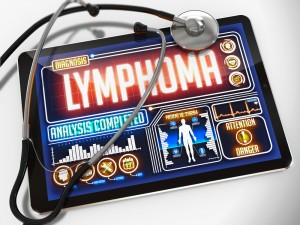 A new study entitled “PD-1 Blockade with Nivolumab in Relapsed or Refractory Hodgkin’s Lymphoma” reports nivolumab as a safe and efficient new treatment for patients with refractory or relapsed Hodgkin’s Lymphoma. The study was published in the New England Journal of Medicine.
A new study entitled “PD-1 Blockade with Nivolumab in Relapsed or Refractory Hodgkin’s Lymphoma” reports nivolumab as a safe and efficient new treatment for patients with refractory or relapsed Hodgkin’s Lymphoma. The study was published in the New England Journal of Medicine.
Hodgkin’s Lymphoma is characterized by the presence of large malignant cells, called Reed–Sternberg cells, that express high levels of two ligands, PD-L1 or PD-L2. The receptor for PD-L1 and PD-L2 is a protein – PD-1 – which is found at the surface of T cells, and upon activation induces the programmed death 1 (PD-1) pathway, leading to the shutdown of T cell mediated immune response. Thus, expressing both ligands renders tumor cells the ability to escape an immune response.
Nivolumab is an immunomodulator that works by blocking the PD-1 receptor on activated T cells, therefore, blocking its interaction with the PD-L1.
In this study, a team of researchers from the Mayo Clinic assessed whether treating patients with nivolumab could prevent tumor cells to evade an immune response. As such, they administered nivolumab to 23 patients with relapsed or refractory Hodgkin’s lymphoma (previously treated with other therapeutics) during two weeks and at high doses (3 mg/kg).
The team observed an efficient response to the therapeutics in 87 percent of the cases, with 17% and 70% exhibiting complete and partial response, respectively. After 24 weeks, progression-free survival was observed in 86% of the patients.
The most frequent nivolumab related adverse reactions included rash and decreased platelet counts. Currently, 11 patients are still participating in this phase I study, while 12 patients discontinued the study due to stem-cell transplantation (6 patients), disease progression (4 patients) and drug toxicity (2 patients).
When the authors examined tumor samples from pretreated patients, they observed an altered genetic profile, including increased copies of PD-L1 and PD-L2 genes, leading to an enhanced expression of these ligands in malignant tumor cells.
Thus, the authors highlight that since therapeutic options for patients with Hodgkin’s lymphoma are rather limited, with patients often exhibiting disease progression after autologous stem- cell transplantation and short-term responses to brentuximab after relapse, treatment with nivolumab represents a potential new therapy for Hodgkin’s lymphoma relapsed and refractory patients.
Stephen Ansell, M.D., Ph.D., a hematologist and one of the study leading authors commented in a press release, “Nivolumab is a very promising agent that is reasonably well-tolerated and can easily be combined with other agents in the future. There is evidence now that you can fight cancer by optimizing your immune function, either by enhancing signals that stimulate the immune response or blocking signals that dampen it. There are a number of trials already underway to further validate and confirm these results in Hodgkin’s lymphoma, and those studies are accruing extremely fast because of these interesting data. I would predict that it won’t be long before this particular agent will be approved, and then we will see other studies exploring how to administer it most effectively. For example, rather than using it after other approaches have failed, we could combine it with more standard treatments as frontline therapy in the hopes of generating better outcomes.”


